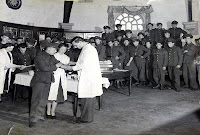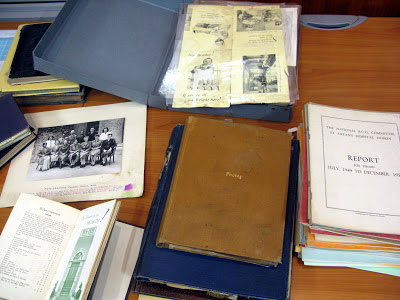Guest Post: Vaccination against tuberculosis in 20th century Ireland
Firstly a belated congratulations to Dr Anne Mac Lellan, who won the 2012 RCPI History of Medicine Research Award, and also to Alice Mauger, who won the prize for the best history of medicine poster. Further details of the shortlisted applicants for this year's prize can be found here. Both Anne and Alice have agreed to talk about their research on the RCPI blog, and today's guest post comes from Dr Anne Mac Lellan. Anne is Director of Research at the Rotunda Hospital, she completed a Wellcome Trust funded PhD in UCD's Centre for the History of Medicine in Ireland in 2011. She continues to research various aspects of the tuberculosis epidemic in Ireland in the 20th century and this post looks at some of the sources held by RCPI's archive which she has made use of for her research.
When a new Irish State was founded in 1922, the biggest public health problem it inherited was tuberculosis which predominated in overcrowded urban areas. Another problem within the new State was lack of employment opportunities and consequent emigration. These migrants mainly came from rural areas – the west and southwest of the country. Many of them were under 20 years of age.
 |
| BCG vaccination of student nurses |
In England, the medical community and the public worried that young Irish migrants were seeding tuberculosis into English communities. However, it gradually became apparent that what was happening was that young Irish rural migrants had not been exposed to tuberculosis and had no immunity against the disease. When they went to urban centres in England, they often developed tuberculosis. This was a particular problem for probationer nurses and medical students who were exposed to high levels of infection on the wards.
 |
| Tuberculin testing of army recruits |
When the Irish National BCG Committee was set up in 1949, under the chairmanship of Dr Dorothy Price, one of its key target groups was these vulnerable young rural Irish emigrants. Vaccination against tuberculosis was offered on a voluntary rather than a mandatory basis and it proved difficult to persuade this group of young people that vaccination was 'as vital' as their boat ticket. The National BCG Committee was criticised for its failure to vaccinate young emigrants however this was somewhat unfair as vaccination was made readily available by the Committee which also issued propaganda targeted at these emigrants.
Copies of the reports of the National BCG Committee are held in the RCPI's Heritage Centre and they are a valuable source of quantitative and qualitative data with respect to tuberculosis and BCG vaccination in Ireland.
Dr Dorothy Price (1890-1954) was a childhood tuberculosis expert who worked in
St Ultan's Infants Hospital, in Dublin. St Ultan's archives are also stored in the RCPI. It is possible to peruse albums of photographs of staff and patients in the hospital which was founded in 1919 by Kathleen Lynn and Madeleine ffrench Mullen. It is also possible to read the minutes of committee meetings and to peruse annual reports.
 |
| Saint Ultan's Hospital Archive |
Anyone with an interest in Ireland's vaccination campaign against tuberculosis would be well advised to consult the reports of the National BCG Committee while anyone with an interest in St Ultan's Hospital and the doughty women who worked there should consult the hospital's archives in the RCPI.
Anne Mac Lellan